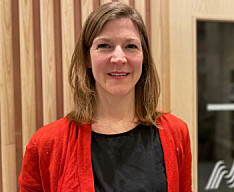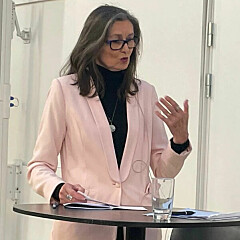
Over 55 and looking for a job? Here are one researcher's tips for succeeding
Researcher Anne Grethe Solberg has interviewed mature job seekers. She clearly sees what works and what doesn't work in getting a new job.
What should you do if you find yourself in a situation where you, voluntarily or involuntarily, have to enter the labour market at a ripe old age of 55 or older?
Anne Grethe Solberg, a researcher at the Work Research Institute at Oslo Metropolitan University (OsloMet) has looked at this exact question.
Her study is based on in-depth interviews with 37 people between the ages of 56 and 71. All had relatively high levels of education and a long professional career behind them.
A lot of hard work
There’s a lot of hard work involved in changing jobs at a mature age, Solberg has found.
Finding a new job was particularly tough for people who had been downsized.
“Some people probably overestimated how easy it would be to get a new job,” Solberg said.
All jobs are currently available online. Almost everyone she interviewed was up-to-date on technological solutions. They knew how to look for a new job. They were on LinkedIn and Facebook and were conscious of their digital footprint.
However, not everyone was equally good at writing their CV.
“When you have had a long career, you have a lot to show for it. But the digital space only allows you to include a little of your experience on your CV. Many people consequently struggled to write a good CV,” Solberg said.

Your attitude matters
Many of the people she interviewed got new jobs.
Some had encountered employers who completely disregarded age.
Others felt that their age was decisive in their failure to get an interview or employment.
People’s attitudes towards looking for a job played a big role in how the search went, Solberg said.
She presented her findings at a seminar organized by the Centre for Senior Policy in February. The centre also commissioned the study.
Don't think about age
Several studies have shown that there can be age discrimination in the workplace. International research shows that age has become the most widespread basis for discrimination in the workplace, sciencenorway.no wrote in 2022.
Solberg said in an interview with sciencenorway.no that mature job seekers should not be concerned about age discrimination.
“The moment you start to think that you are subject to discrimination, you have lost. You become discouraged. Rather, you should show your potential employer that you are the right person for this job,” she said.
Solberg has been a gender researcher for many years and has met many women who want to apply for top management jobs.
She says the same situation can apply to these women.
“You won't get a top management job if you go around talking about the glass ceiling, meaning the invisible barriers that make it difficult for women to reach the top,” she said.
Is age an issue?
When you have to show a potential new employer the resources you offer, you have to take the right steps.
“You have to crack codes and understand how the employer thinks. That's what gets you the job,” Solberg said.
She saw clear differences between those she interviewed: Some focused on the fact that there was age discrimination in the workplace.
For others, age was not an issue.
Many were headhunted
Many of the 37 jobseekers she interviewed were headhunted into a new job, despite their advanced age.
There were some patterns that crystallized among these candidates, she says.
“These jobseekers typically had a focus on the responsibilities and tasks at work. They also prepared thoroughly before the job interview. They googled the people who were going to interview them and they read annual reports,” she said.
They were also very aware of how they should present their own expertise, she said.
Like a date
A job interview is like being on a date.
The person you are with should think that you are the most wonderful worker they can hire. But you must also show that this is your dream job.
The people who got jobs understood that they had to present the best version of themselves during the interview, says the researcher.
“They showed a conscious humility and held back a little rather than bragging about their expertise. They showed that they were learning oriented. And they willingly positioned themselves below those who interviewed them, who were often 20 years younger,” she said.
Others were not willing to present themselves like this. “They thought: ‘They have my CV, so they must know what I can do’,” Solberg said.
Expertise trumps age
The researcher believes her study indicates that expertise trumps age.
In other words, you should be less concerned about age when you apply for a job and more concerned about what you can do, she said.
Gro Møllerstad, an experienced recruitment consultant, agrees. She has worked with recruitment for 23 years.
“I really recognize myself in the results of this study,” she said at the seminar.
Her experience is that expertise matters most.
“The job interview is very important. If you manage to convey what you can do and make the employer confident about it, age matters less,” Møllerstad said.
We must be prepared to lose our jobs
Møllerstad believes that everyone must be prepared to lose their job at some point in their lives.
That means our CVs must demonstrate that we are up-to-date.
If you lose your job involuntarily, you have to have a contingency plan. If you don’t, it will be difficult to enter a job market that requires you to be ‘fresh’, she said.
“You have to be well prepared. The person who succeeds is the person who has done their homework,” she said.
Is there age discrimination?
Solberg thinks it would be interesting for researchers to take a closer look at whether there really is widespread age discrimination in Norwegian workplaces.
She is not convinced that all employers keep the elderly down. There is an enormous need for skills out there that needs to be met, she said.
As a researcher, you may look at things differently when you go into this research field, she believes.
“I haven’t interviewed employers for this study. I have only heard stories from job seekers. It might have been different if I had interviewed employers about what they thought,” she said.
In another study, she interviewed HR directors. They emphasized that it was very important to have both older and younger people in a workplace.
Many are struggling
Even though unemployment in Norway is low and the battle for skills great in today's labour market, many people continue to struggle to get a job.
Of those in their 50s who lose their jobs, 60 per cent are still without a job after three years, according to the Centre for Senior Policy.
“Older jobseekers have to be a little more strategic and tactical in order to succeed among all jobseekers. It takes time to get a new job, but it is possible,” said Kari Østerud, director of the Centre for Senior Policy.
Translated by Nancy Bazilchuk
Reference:
Anne Grethe Solberg: Hvordan opplever aldersgruppen 55+ å søke ny jobb? (How does the 55+ age group experience looking for a new job?) Work Research Institute, OsloMet, Report 2023:7 (in Norwegian)
———
Read the Norwegian version of this article at forskning.no





































